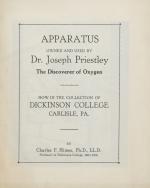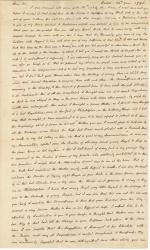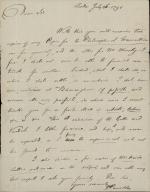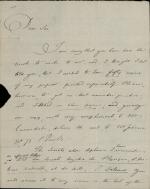"Apparatus Owned and Used by Dr. Joseph Priestley," by Charles F. Himes

Professor Charles F. Himes, a member of the Class of 1855, describes the collection of Joseph Priestley's equipment held at Dickinson College.


Professor Charles F. Himes, a member of the Class of 1855, describes the collection of Joseph Priestley's equipment held at Dickinson College.

This pamphlet describes the collection of Joseph Priestley's equipment held at Dickinson College. This pamphlet was produced to coincide with the establishment of the Joseph Priestley Award in 1952.

Publisher: Harrisburg, PA: The Telegraph Press
Volume 3 of the Boyd Lee Spahr Lectures in Americana series includes essays from scholars that focus on various aspects of Dickinson College's history.

Dickinson President Charles Nisbet writes eight letters to William Young, a bookseller and printer in Philadelphia, that mostly regard the political state of affairs in America and Europe, particularly the French Revolution.

Architect Benjamin Henry Latrobe writes to Mary Hazlehurst Latrobe, his second wife, about his dinner with President Thomas Jefferson. Latrobe discusses the other guests at the dinner and the his thoughts on building a drydock for the United

Joseph Priestley writes to Joseph Barrington a few days before his death on February 6, 1804 about his views on Christianity.

Joseph Priestley Jr. writes to John Beckley and asks about having a tract of land surveyed on behalf of his father, Dr. Joseph Priestley, who is "very unwell."
Dr. Joseph Priestley writes to James Taylor with instructions regarding which picture of Dr. Priestley should be used. "The picture taken of me by Stewart at the request of the Philosophical Society is much better than that taken by Mr.

Joseph Priestley writes to Samuel Latham Mitchell and invites him to come visit at Northumberland as well as asks about a package that was supposed to have been sent.

Joseph Priestley writes an unknown recipient and notes that he has enclosed "two copies of my Paper for the Philosophical Transactions." In addition, Priestley requests a "fresh stock of

Dr. Joseph Priestley writes to Rev. John Edwards and discusses their recent publications as well as a publication that they are both working on.

Joseph Priestley writes to Rev.

Joseph Priestley writes to the Duke of Northumberland, Hugh Percy, and asks for the Duke's patronage in order to write a history of experimental philosophy, continuing his previous work. Transcript included.

Joseph Priestley writes to Thomas Wedgwood about supplies for the laboratory that Priestley is building after his previous one was destroyed and discusses invitations to move from England to France.

A six page bibliography of 75 books written by Dr. Joseph Priestley.

Charles Nisbet writes bookseller William Young to discuss various political and religious events in France, Ireland, and the United States.

Joseph Priestley writes to Anna L. Aikin of Warrington Academy about her poetry on Corsica for James Boswell and Samuel Johnson. Priestley also provides Aikin with an update on his own writing.

Dr. Clarence E. Jackson presents this paper, "Oxygen- The Good and Bad Performer in Welding," at the 1st BOC Priestley Conference in Leeds, England in September 1977. The paper includes 20 illustrations.

Joseph Priestley sends instructions for printing his manuscript (Index to the Bible) and orders several copies of his Church History and Lectures. Priestley also tells John Vaughan that he is out of oysters.

Sarah Vaughan writes to Sarah Franklin Bache, daughter of Benjamin Franklin, introducing her to Mrs. Joseph Priestley and hoping that she will "be so kind when opportunity offers to introduce her to some of [Bache's] friends..."

Matthew Boulton provides an account of the Birmingham riots in England and the destruction of property, including Joseph Priestley's house. The recipient's identity is unknown. Transcript included.

Joseph Priestley offers the Rev. Mr. Kell a horse for him to ride to Cradley. Priestley also includes 7 lines of text written in Annet's Shorthand.

Joseph Priestley provides Sir Charles Blagden, the Secretary of the Royal Society, with a list of errors in his paper for the Transactions and asks him to correct the "important" ones before it is p

Joseph Priestley writes Sir Charles Blagden, the Secretary of the Royal Society, and asks him to “lay before the Royal Society Mr.

Joseph Priestley writes Sir Charles Blagden, the Secretary of the Royal Society, and asks for 50 copies of his paper printed and stitched in blue cloth. In addition, Priestley requests that one copy be sent to Henry Cavendish.